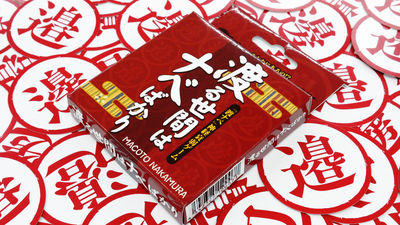A cooperative card game 'THE GAME Obaku or Shiki no Uji no Akuma' play review, putting cards with each other's feelings in order to seal Akuma.

' The Game Stunts and Squids's Akuma ' is a game in which 2 to 98 number cards are placed on the spot like '
THE GAME Stunts and Squirrels' Acupuncture Acma There are a lot of accompaniments in the stricken mansion! Let's seal together with everyone ♪ ... but don't say only numbers!
http://www.arclight.co.jp/ag/index.php?page=products&code=LG-0345
This is the package of 'THE GAME Obaku or Shiki no Uji no Akuma'.
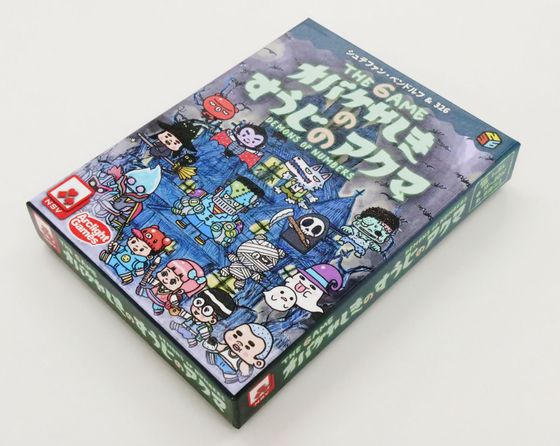
THE GAME Stalls and Squids's Akuma is a renewal of the German card game '
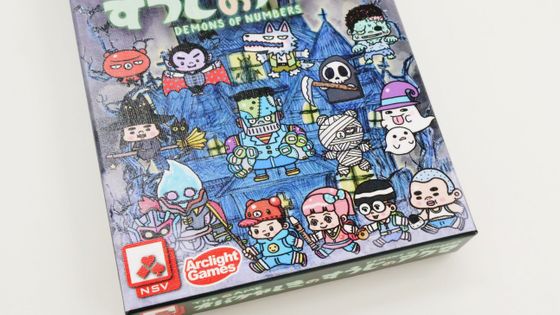
The number of players is 1 to 6, the play time is 15 to 30 minutes, and the target age is 8 years or older.
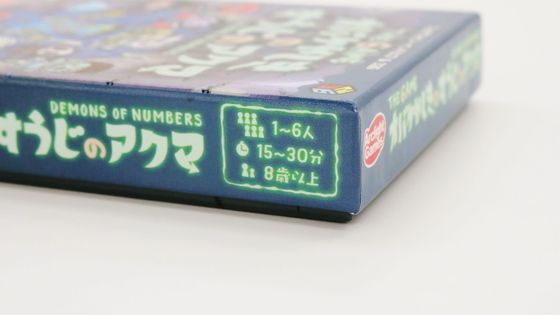
The box contained a set of cards, a magic sheet, and a manual.
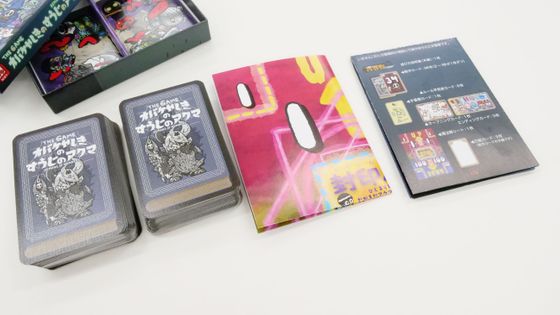
THE GAME Obaku or Shiku no Uji's acme, according to the rules, arrange ' number cards ' with numbers from 2 to 99, and if all the number cards are misplaced, everyone wins, and all cards are left It is a cooperative card game that will be defeated.
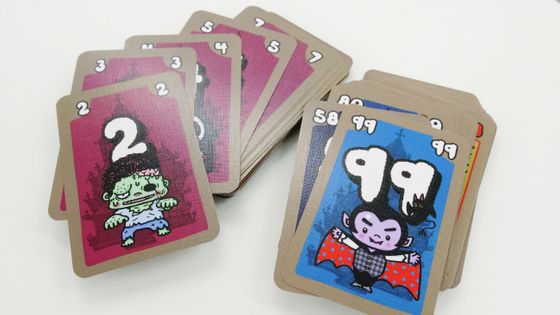
Some number cards have special effects, such as 'Draw 2', which 'draws two cards for the next person', and 'silence', such as 'no conversation when seen in play'.
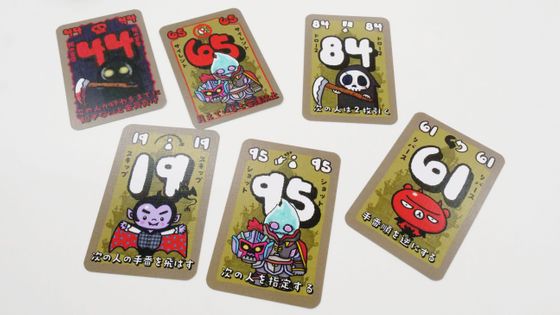
The 'Death of Death' card is a vicious effect: 'If you don't hide until the next person is over, you all lose.' You need to put all the cards in play to win, so you can not avoid passing 'a death sentence'.
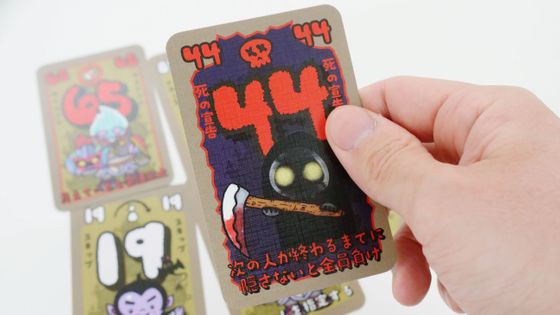
There are 'rule cards' that explain the rules and support the progress, and the rules of the game are summarized here in a simple and easy-to-understand manner, so that players can check the success rules at hand.
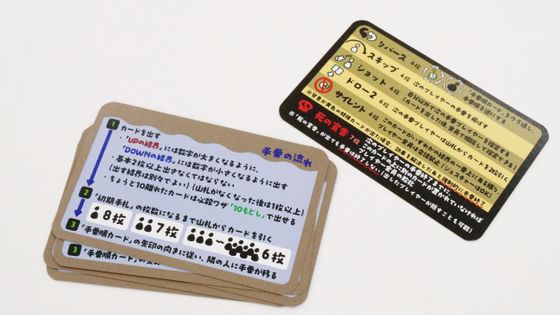
The 'Corporate order card' indicates whether the game progresses clockwise or counterclockwise. The opening card and the ending card explain the world view of this game in an easy-to-understand manner.
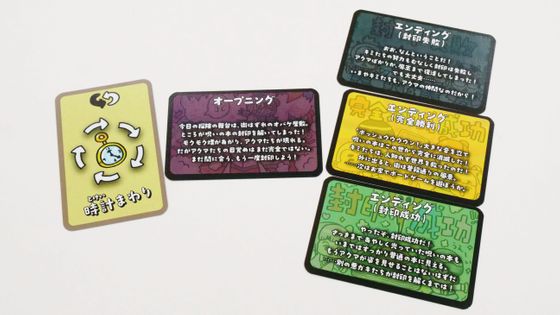
Let's try playing it. The opening card says, 'The stage of today's expedition is the ghostly residence on the edge of the city. But the seal of the curse book has been unblocked! The smoke of the mokomoku rises and the akumas appear. But the akumas' awakening is not perfect. I'm still in time, let's seal again! ' The goal of the game is to re-seal the akma to the book so that the world is not taken over by the akma from the Book of Curses.
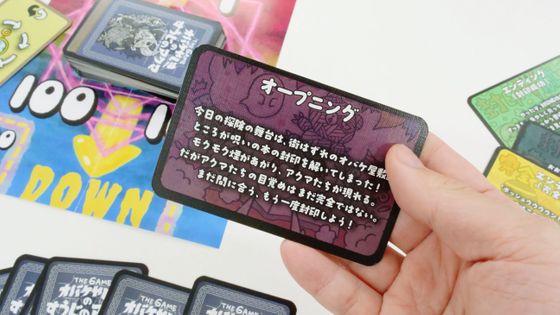
The method of sealing is to put all the number cards in 'places' at the four corners of the magic square sheet. The player places his or her hand on the 'place' according to the rules, draws the hand card from the hand so that it has the specified number of cards, and reduces the hand. After all the decks are gone, if all the cards are all out, the player wins completely. Akuma is sealed again and the world returns to peace.
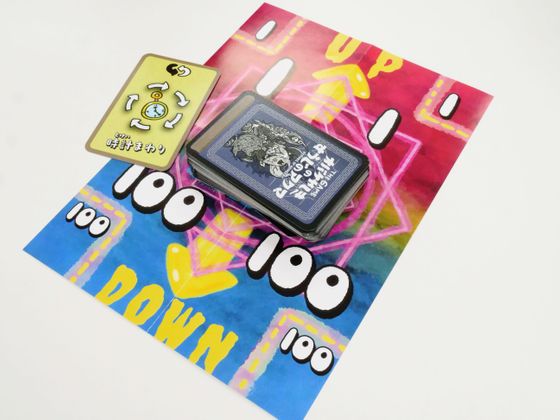
The rule of placement is to place a 'larger number' or 'smaller number' hand on top of an already placed card. It is possible to put a 'large number' number card in the storage marked 'UP'.
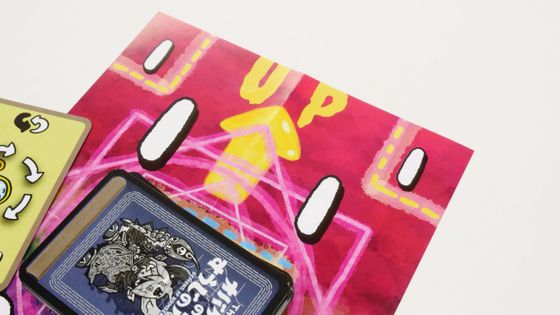
It looks like this when you try it. '4' on the initial arrangement '1', '24' on '4' on the initial arrangement 'OK' even if you put the hand in any order if the number becomes larger.
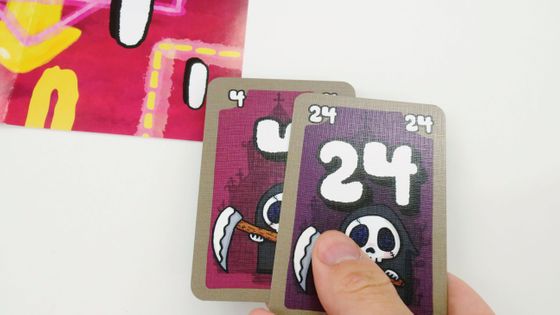
On the blue side marked 'DOWN', you can place the number cards 'in order of decreasing number'.

The game starts with handing the specified number of hands to each player, and the number of initial hands varies depending on the number of players. Since four players play this time, the number of initial hand cards is six.
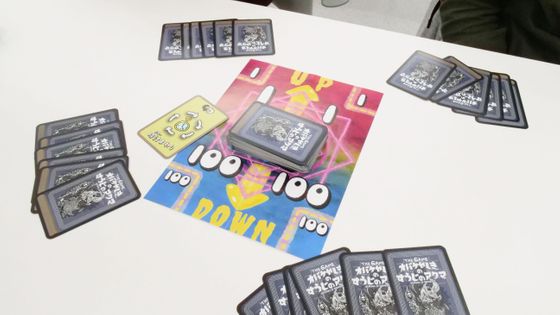
The player must put at least 2 cards in play every turn. It is OK to put two pieces in the same storage, and it is OK to put one piece at a separate place.
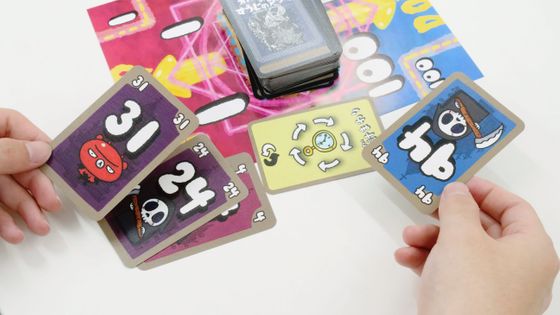
After placing the number card, draw the number card from the bill so that the hand is the initial number, and the turn end.
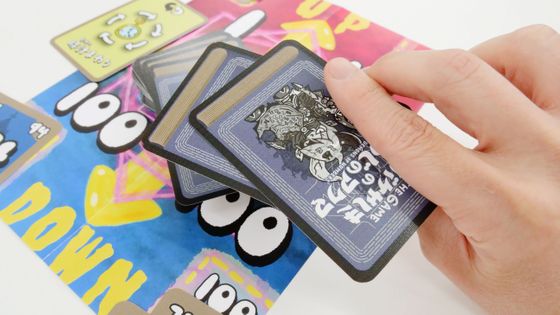
One important special rule is ' 10 Back '. '10 back' is something that can be placed against the law of large and small numbers only when the difference between the playing card and the hand is just '10'. For example, if the number card of '72' is placed in the place of 'DOWN', only 'less than 72' card can be placed originally, but 82 cards are placed by '10 back' and it is OK. You
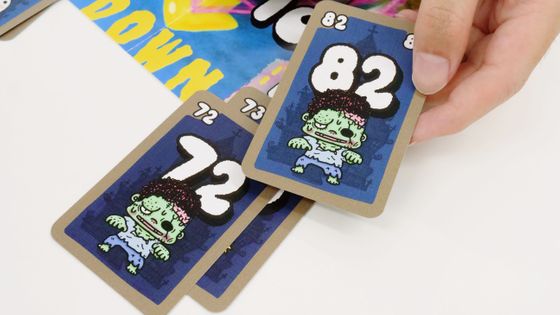
In addition, because the game of THE GAME Obscene and Shikuji Akuma is a game aiming at winning together, 'communication' becomes important. Tell the other players that 'I do not want to put cards in this yard because I have a card I really want to put out ...' or 'Could I put cards in this yard?' It is possible. However, the act of saying the number of the card you have is NG.
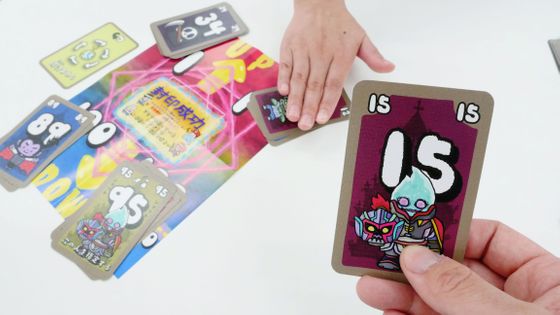
It is also not good to convey numbers in a non-direct way such as '2 to the 5th power!' Or 'germanium atomic number!' Or to show off your hands. Therefore, there are frequent conversations such as 'I want to put it here, but even a far away number?', 'How many numbers do you fly?' The players try to communicate the number cards they want to put, such as 'fine', 'little', 'hello little', etc. However, there are many times when the feeling is not transmitted. Rather, it may be said that this frustration is the best.
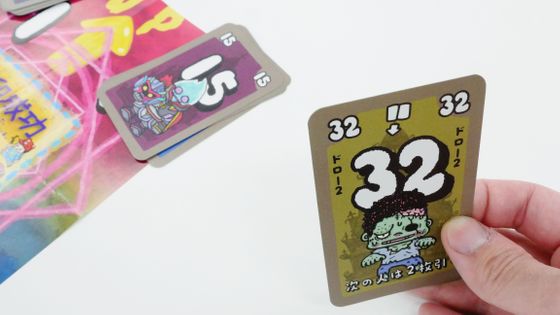
'Death of death' card of the vicious effect of 'everyone is defeated by the end of the next person's defeat' is also ......
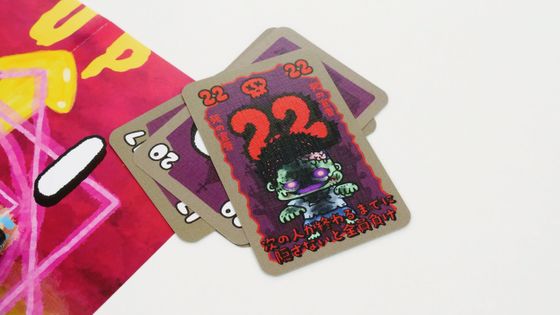
It will be easier to handle if you communicate in advance that 'Place the 'Death of Death' card here, is it alright?'
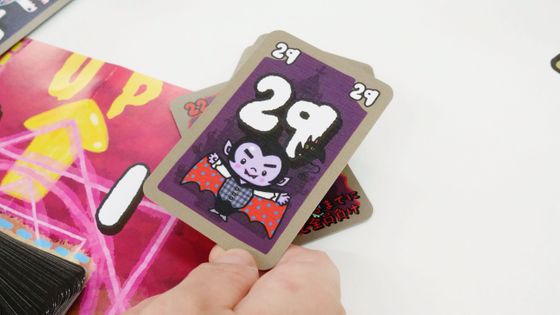
The 'special card' such as Draw 2 has a yellow background, and when it is put into play, the turn is forcibly ended. 'Draw 2' is a card that puts the opponent at a disadvantage in 'UNO' etc. However, in THE GAME Obaku or Sakunoshima's Akma, there are more card options that can be taken out as the hand increases, so it is rather a card with a positive effect. It has become.
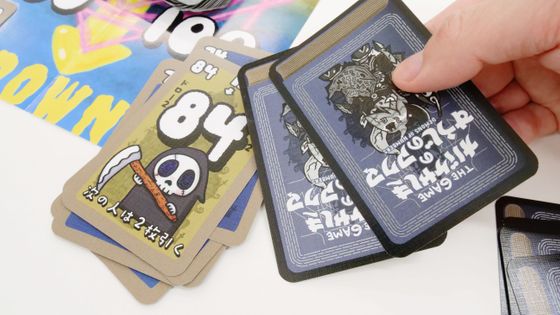
When you can '10 back' with your own hand, such as '25' and '35', you have a chance to actively take out and contribute to the team. Anyway, it will be more and more difficult if you do not actively perform '10 Back', so it seems important to think 'Can you do' 10 Back '?
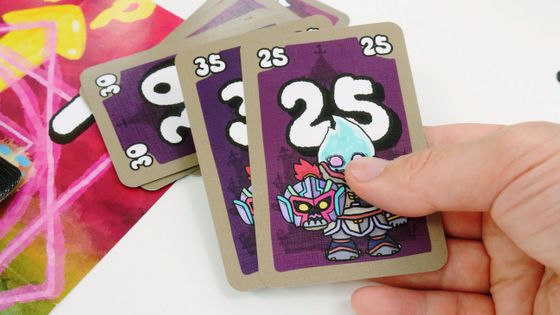
If there are three or more players, there will always be six cards in hand, but as the game progresses, you will find it surprisingly 'less than six'. In this case, if you put '97' in the place of 'UP', you can only put out '98' and '99' in the place, so it is hesitation to put it out. For the same reason, the '15', '19' and '92' cards in hand are also difficult cards to win for victory. In this way, as the game progresses, the number of cards that “it is difficult to get out of the team's victory” increases, so the rule that “you have to get 2 cards in your turn” is heavily weighted.
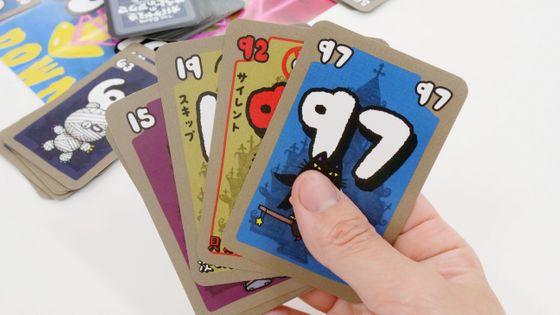
In the meantime, another player insists that 'you can only get out of here!' And '98' will be put in the reserve. One step late to put the '97' at hand.
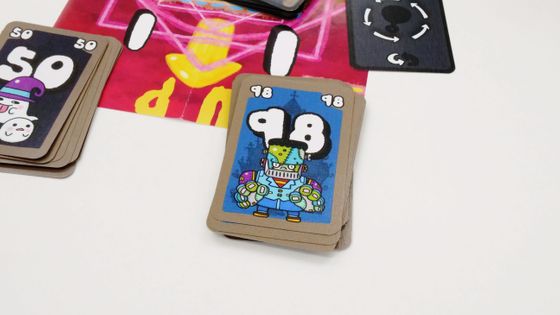
When I was desperate, another player performed '20 back' at once, saying 'I can do 10 backs twice!' We are all pleased with the message, 'Now the victory is approaching!'
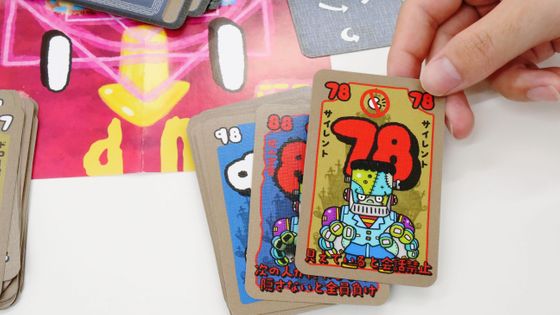
The 'silent' card effect of 'do not talk while in sight' prohibits verbal expression of the excitement. As it can not be helped, we progress with the game while communicating with each other and cheering on each other or communicating with gestures such as 'Don't put it there!'
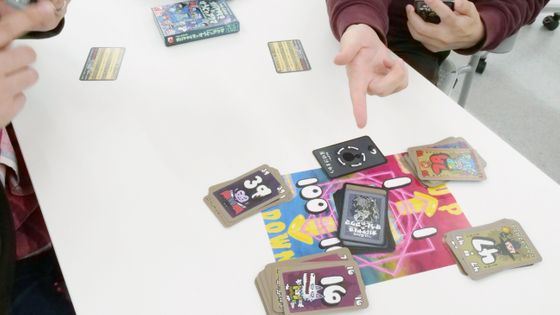
When the 'silent' effect just broke, the deck was gone. When the deck is exhausted, the game is in the second stage, and the place where you had to issue two cards in one turn will be OK in 'one turn'. If all players have 0 cards in hand, 'full victory', humanity can beat Akma.
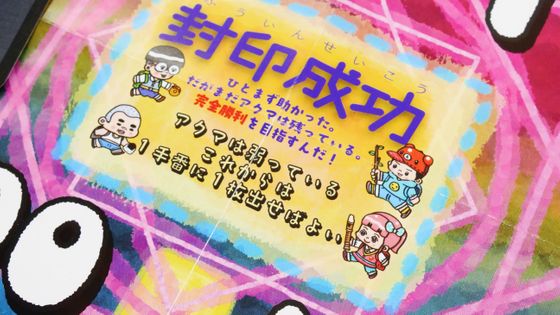
But at the end of the game the game gets a lot harder. There are still enough room for cards '46' '14' and '46' or less in the 'DOWN' field, but only '99' '89' and '89' or more are in the 'UP' field I can not put it on the stage If you can not make full use of '10 back', you can not put the '46 or more and 89 or less' card into play.
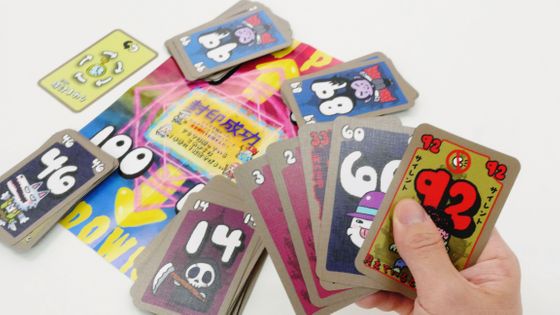
After all, '76' is in player A's hand and '92' and '60' are in B's hand, and the game is over. Unfortunately, I could not do 'full victory', but the 'seal success' ending card was drawn with a festive illustration.
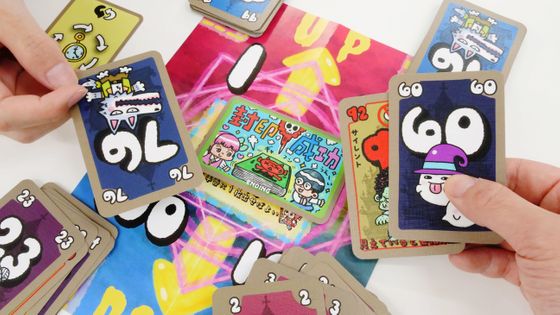
When I actually played it, it was a card game where I could enjoy the 'oneness of players for the difficult situation', saying, 'We will unite with each other while making clear communication with each other and endure the hardships.' In the final stage, there are no cards available, and the situation is only getting worse, but the more difficult it becomes, 'Well, can I leave it?' 'No, I'm asking if you put it here. The conversation is exciting. The level of difficulty is also exquisite, and it is an impression that it will be manageable until you get used to 'sealing success', which is a temporary victory where the deck disappears, but 'complete victory' has become a considerable degree of difficulty, and several times with many people I also felt that I could play it.
In addition, THE GAME Obaku and Shiki no akamu can play one person. When I actually played it, I felt that it was a super difficult level, with one person getting a 'clogged' number card in his hand in a few turns. The more people there are, the lower the level of difficulty, so it may be better for playing with friends.
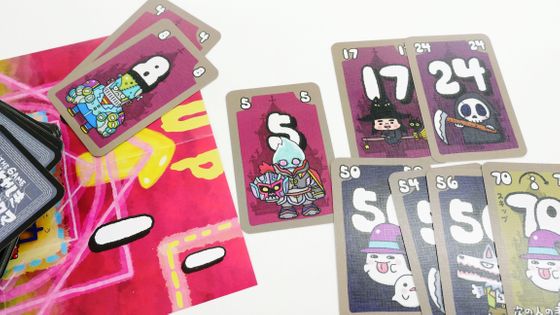
You can purchase 'THE GAME Stunts and Squids no Acma' for 2160 yen including tax. At the time of article publication, it was possible to purchase for 12% off tax-included 1904 yen from Amazon.co.jp.
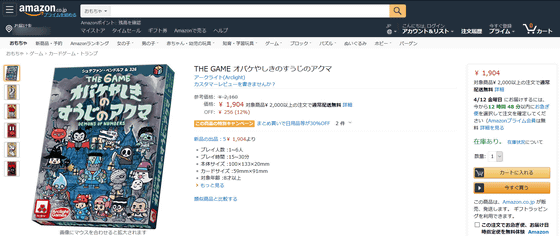
Related Posts:






